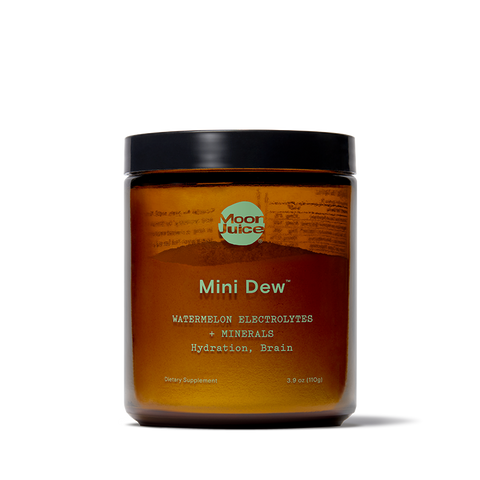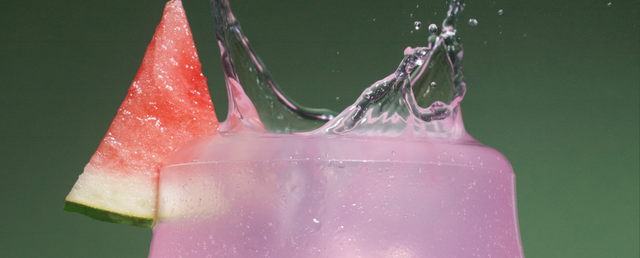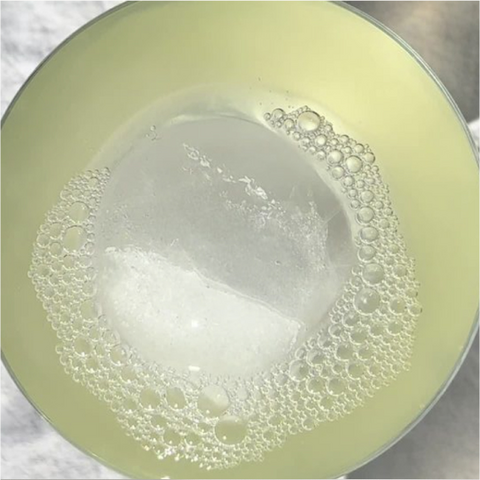Is there anything better than slicing up and biting into a ripe, juicy watermelon on a scorching summer day? To sweeten the proverbial pot, it turns out that the quintessential warm-weather fruit won’t only delight your taste buds. This hydrating food will also count towards your necessary daily fluid intake and improve electrolyte levels thanks to a few key micronutrients.
In this article, you’ll discover the ins and outs of consuming watermelon for hydration. We’ll also cover how to get a taste of this hydrating fruit’s sweet flavor on the daily — yes, even when it’s out of season — plus even more mineral-powered, fluid-balancing perks.
Is Watermelon Good for Hydration?
With a name like watermelon, it’s natural to assume that the summer fruit is hydrating… and you’d be entirely correct. According to UCLA Health, watermelon is one of the richest food sources of H2O, boasting as much as 92% water content. Since the human body consists of 60 percent water itself, it’s crucial to replenish your stores — especially when you expel excess fluids via sweating, urinating, and even breathing.
As a quick reminder, hydrating entails replacing fluids lost throughout the day. Per Texas Health and Human Services, the body loses an average of 2 to 3 quarts of water daily. If you drink water and eat hydrating foods with high water content (watermelon among them) every day, you won’t just help keep dehydration — and accompanying symptoms like thirst, dizziness, fatigue, and mood imbalances — at bay.
In fact, water is essential to promote and maintain bodily functions as various as:
- Transporting nutrients and oxygen to cells
- Helping convert food to energy
- Regulating your core body temperature
- Protecting vital organs
- Lubricating joints
Simply put, drinking water isn’t the only thing that can help bump up your H2O intake for the day. Thanks to its high water content, watermelon hydrates you very well. Even more impressively, it goes beyond hydration alone.
Is Watermelon Good for Electrolytes? H3
Yep, watermelon is good for hydration. But did you know that it’s also one of the top foods with electrolytes?
As a friendly reminder, electrolytes are specific minerals — including Calcium, Magnesium, Chloride, Sodium, and Potassium — that carry electrical charges. Electrolytes are necessary for everything from regulating chemical reactions, maintaining the balance of fluids in cells and throughout the whole body, and supporting adequate hydration. Pretty much every cell in the human body contains electrolytes, so it’s important to maintain them to stave off the symptoms of electrolyte imbalance. In order to reap the full benefits of electrolytes, it’s recommended to up your daily intake through supplementation or consuming hydrating foods. (Some symptoms overlap with telltale signs of hydration, including brain fog, constipation, diarrhea, muscle cramps, nausea, vomiting, and numbness/tingling.)
Now, back to watermelon and electrolytes: According to the USDA, a single cup (approximately 150 grams) of diced watermelon packs:
- 10.5 mg of Calcium
- 15.2 mg of Magnesium
- 170 mg of Potassium
- 16.7 mg of Phosphorus
In addition to being a great source of a few vital electrolytes, this fresh fruit also offers:
- L-citrulline, an amino acid beneficial for vascular health and blood flow that may also help maintain protein homeostasis and improve post-workout muscle soreness and heart rate recovery
- Lycopene, an carotenoid beneficial for blood pressure and enhancing the nutritional value of foods
Watermelon is the gift that keeps on giving. According to a 2022 study published in the journal Nutrients, children and adults in the U.S. who consumed watermelon had a 5% higher intake of the electrolytes Magnesium and Potassium, as well as Vitamin A and dietary fiber. They also showed a generally higher intake of lycopene and other antioxidants. As such, the researchers determined that consuming watermelon can boost nutrient intake and improve overall diet quality.
Does Watermelon Hydrate Better Than Plain Water?
Not to put the kibosh on existing recommendations for daily water intake — which, BTW, vary across sources and factors like age, climate considerations, and activity level — but plain water does have its limitations. Water isn’t abundant in electrolytes, which again are crucial for your health at a cellular level. Even if you sip on water throughout the day (and lots of it, at that), you may urinate more frequently, which can actually lead to electrolyte loss.
Electrolytes — including those naturally found in watermelon — will help ensure that your cells are able to absorb sufficient amounts of water you consume. In this sense, watermelon may have an edge on plain H2O… but the reality is that you can’t depend on watermelon alone for hydration or electrolytes.
All things considered, balance is key. That said, watermelon and other electrolyte-rich, water-rich foods can absolutely complement, but shouldn’t entirely replace, your daily water intake.
Hydrate With Mini Dew
By now, we know the good news: Watermelon isn’t only incredibly hydrating, but also beneficial to promote fluid balance in the body via electrolytes. The not-so-good news, however, is that most of us won’t be able to get our fix of the fresh fruit 365 days a year.
To overcome this minor roadblock, consider taking Mini Dew™: an organic watermelon-flavored electrolyte drink powder. In addition to delighting your palate, it’s a tasty solution to quench your brain and body courtesy of:
- A microplastic-free pink salt electrolyte, which supports optimal hydration by maintaining water balance in and around cells*
- Ionic trace minerals, which gives the body the elements it needs to feel good and energized*
- Chelated essential minerals, which help enhance cognitive performance and reduce brain fog*
Mini Dew™ takes your standard H2O to greater heights. Don’t know when to take electrolytes? Simply mix 1 tsp in 12 oz of water to boost your cup with pro-hydrating, electrolyte-boosting benefits daily.
Whether you're looking for a good source of natural electrolytes or to enjoy this delicious summer snack, watermelon is a great source of nutrients that can support your body in many ways. If you're looking for the perfect boost to your water, try out our Mini Dew electrolyte powder.
Sign Up, Nerd Out
Get wellness tips, education, and recipes
delivered straight to your inbox.
Get wellness tips, education,
and recipes delivered
straight to your inbox.
Sources
- https://www.uclahealth.org/news/15-food-that-help-you-stay-hydrated
- https://www.hhs.texas.gov/sites/default/files/documents/services/health/texercise/importance-of-hydration.pdf
- https://my.clevelandclinic.org/health/diagnostics/21790-electrolytes
- https://fdc.nal.usda.gov/fdc-app.html#/food-details/167765/nutrients
- https://www.sciencedirect.com/science/article/abs/pii/S0899900712002584
- https://pubmed.ncbi.nlm.nih.gov/23862566/
- https://www.ncbi.nlm.nih.gov/pmc/articles/PMC8626194/
- https://www.ncbi.nlm.nih.gov/pmc/articles/PMC9692283/














